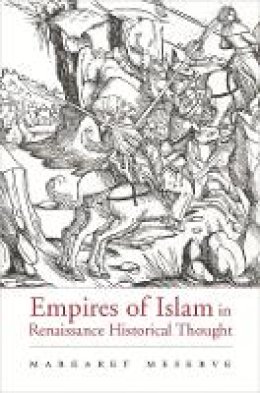
Empires of Islam in Renaissance Historical Thought
Margaret Meserve
Renaissance humanists believed that the origins of peoples could reveal crucial facts about their modern political character. Margaret Meserve explores what happened when European historians turned to study the political history of a faith other than their own.
Meserve investigates the methods and illuminates the motives of scholars negotiating shifting boundaries—between scholarly research and political propaganda, between a commitment to critical historical inquiry and the pressure of centuries of classical and Christian prejudice, between the academic ideals of humanism and the everyday demands of political patronage. Drawing on political oratory, diplomatic correspondence, crusade propaganda, and historical treatises, Meserve shows how research into the origins of Islamic empires sprang from—and contributed to—contemporary debates over the threat of Islamic expansion in the Mediterranean. Humanist histories of the Turks were sharply polemical, portraying the Ottomans as a rogue power. But writings on other Muslim polities include some of the first positive appraisals of Muslim statecraft in the European tradition.
This groundbreaking book offers new insights into Renaissance humanist scholarship and the longstanding European debates over the relationship between Christianity and Islam.
Product Details
About Margaret Meserve
Reviews for Empires of Islam in Renaissance Historical Thought
Anthony Grafton, Princeton University A superb and original study, impressively researched and cogently argued, on a significant aspect of humanist scholarship. It will be of interest to scholars in Renaissance, late medieval, early modern, Ottoman, Turkish, and Islamic studies, as well as a broader audience of readers who follow the growing literature on European views of other societies.
Cemal Kafadar, Harvard University Meserve's achievement is brilliant and important on several levels. She has given us what will become a much cited study on early Western 'orientalism.' She has enormously enriched our understanding not only of Renaissance humanism, but also of the relationship between the humanists and their medieval predecessors, pointing to a reconsideration of what is traditionally viewed as medieval and what is viewed as Renaissance. For decades to come, this will serve as a standard work on the humanist understanding of the Turk.
John Monfasani, State University of New York at Albany Empires of Islam is the product of the most painstaking research. There is not a byway which Margaret Meserve has not followed to trace the intricate debates of the time. But the contribution made by her book goes further than the polemics centered on the origin of the Turks. It helps us to reassess humanist historiography in its broadest sense.
Alastair Hamilton
Times Literary Supplement
